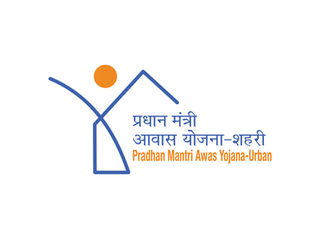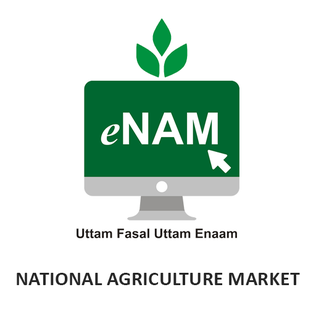
The Pradhan Mantri Gram Sadak Yojana (PMGSY) is a nationwide plan in India to provide good all-weather road connectivity to unconnected villages. Of 178,000 habitations with a population of above 500 in the plains and above 250 in the hilly areas planned to be connected by all-weather roads, 82% were already connected by December 2017 and work-in-progress on the remaining 47,000 habitations was on-track for completion by March 2019.

Agriculture in India is highly susceptible to risks like droughts and floods. It is necessary to protect the farmers from natural calamities and ensure their credit eligibility for the next season. For this purpose, the Government of India introduced many agricultural social insurances throughout the country, the most important one of them being Pradhan Mantri Fasal Bima Yojana.

Pradhan Mantri Jan Dhan Yojana is a financial inclusion program of the Government of India open to Indian citizens, that aims to expand affordable access to financial services such as bank accounts, remittances, credit, insurance and pensions. This financial inclusion campaign was launched by the Prime Minister of India Narendra Modi on 28 August 2014. He had announced this scheme on his first Independence Day speech on 15 August 2014.
Pradhan Mantri Suraksha Bima Yojana is a government-backed accident insurance scheme in India. It was originally mentioned in the 2015 Budget speech by Finance Minister Late Arun Jaitley in February 2015. It was formally launched by the Prime Minister Narendra Modi on 8 May in Kolkata.
Pradhan Mantri Jeevan Jyoti Bima Yojana is a Government-backed Life insurance scheme in India. It was originally mentioned in the year 2015 Budget speech by the then-Finance Minister, late Arun Jaitley in February 2015. It was formally launched by Prime Minister Narendra Modi on 9 May in Kolkata. As of May 2015, only 20% of India's population has any kind of insurance, this scheme aims to increase the number.

Atal Pension Yojana, formerly known as Swavalamban Yojana is a government-backed pension scheme in India, primarily targeted at the unorganised sector. It was mentioned in the year 2015 Budget speech by the Finance Minister Arun Jaitley. It was launched by Prime Minister Narendra Modi on 9 May 2015 in Kolkata. Its main objective is to help towards economic security of those people who become depressed after their working age and take retirement from professional life.

Pradhan Mantri Awas Yojana (PMAY) is a credit-linked subsidy scheme by the Government of India to facilitate access to affordable housing for the low and moderate-income residents of the country. It envisaged a target of building 2 crore (20 million) affordable houses by 31 March 2022. It has two components: Pradhan Mantri Awas Yojana(Urban) (PMAY-U) for the urban poor and Pradhan Mantri Awaas Yojana (Gramin) (PMAY-G and also PMAY-R) for the rural poor, the former administered by Ministry of Housing and Urban Affairs and the latter by Ministry of Rural Development. This scheme converges with other schemes to ensure that houses have a toilet, Saubhagya Scheme for universal electricity connection, Ujjwala Yojana LPG connection, access to drinking water and Jan Dhan banking facilities, etc.
Pradhan Mantri Krishi Sinchai Yojana is a national mission to improve farm productivity and ensure better utilization of the resources in the country. The budget of ₹53 billion (US$660 million) in a time span of one year 2015-2016 has been allocated to this scheme. The decision was taken on 1 July 2015 at the meeting of Cabinet Committee on Economic Affairs, approved with an outlay of 50000 crore for period of 5 years.

The Pradhan Mantri fasal bima yojana (PMFBY) launched on 18 February 2016 by Prime Minister Narendra Modi is an insurance service for farmers for their yields. It was formulated in line with One Nation–One Scheme theme by replacing earlier two schemes National Agricultural Insurance Scheme (NAIS) and Modified National Agricultural Insurance Scheme (MNAIS) by incorporating their best features and removing their inherent drawbacks (shortcomings). It aims to reduce the premium burden on farmers and ensure early settlement of crop assurance claim for the full insured sum.
Krishi Unnati Mela is a three-day event launched by Prime Minister Narendra Modi on 19 March 2016 in Delhi. The fair was to create awareness among farmers about the latest agriculture-related technological developments.

Pradhan Mantri Ujjwala Yojana was launched by Prime Minister of India Narendra Modi on 1 May 2016 to distribute 50 million LPG connections to women of Below Poverty Line (BPL) families. A budgetary allocation of ₹80 billion (US$1.0 billion) was made for the scheme. The scheme was replaced by the Ujjwala Yojana 2.0 in 2021.

National Agriculture Market or eNAM is an online trading platform for agricultural commodities in India. The market facilitates farmers, traders and buyers with online trading in commodities.
Saubhagya Scheme or Pradhan Mantri Sahaj Bijli Har Ghar Yojana was an Indian government project to provide electricity to some households. The project was announced in September 2017 by Prime Minister Narendra Modi, who said that the aim was to complete the electrification process by December 2018. Certain households identified via the Socio-economic and Caste Census (SECC) of 2011 will be eligible for free electricity connections, while others will be charged Rs. 500. On 16 November 2017, the government launched a website saubhagya.gov.in to disseminate information about the scheme. The total outlay of the project is Rs. 16, 320 crore while the Gross Budgetary Support (GBS) is Rs. 12,320 crore. The beneficiary household will get One LED lights, one DC power plug. It also includes the Repair and Maintenance of Meter Only (R&M) for 5 years. The scheme was closed in March 2022 since the target of 100% electrification was met.
Pradhan Mantri Kisan Samman Nidhi is an initiative by the government of India that give farmers up to ₹6,000 (US$75) per year as minimum income support. The initiative was announced by Piyush Goyal during the 2019 Interim Union Budget of India on 1 February 2019. The scheme has cost ₹75,000 crore per annum and came into effect December 2018.

Har Ghar Jal is a scheme initiated by the Ministry of Jal Shakti of Government of India under Jal Jeevan Mission in 2019 with the aim to provide 55 litres of tap water to every rural household per capita per day regularly on long term basis by 2024.

The Pradhan Mantri Matsya Sampada Yojana (PMMSY)(http://pmmsy.dof.gov.in/) is an initiative launched by the Government of India to establish a comprehensive framework and reduce infrastructural gaps in the fisheries sector. The scheme was announced by the Finance Minister, Nirmala Sitharaman during her speech in the parliament of India while presenting the Union budget for 2019–20 on 5 July 2019. The government intends to place India in the first place in Fish production and processing by implementing Neeli Kranti (transl. Blue Revolution). This scheme is in line with governments aim to double the farmers' income by 2022–23.
The Government of India launched the Gareeb Kalyan Rojgar Abhiyaan (GKRA) initiative to tackle the impact of COVID-19 on shramik (migrant) workers in India. It is a rural public works scheme which was launched on 20 June 2020 with an initial funding of ₹50,000 crore. GKRA aims to give 125 days of employment to 670,000 migrant workers, approximately two-thirds of the total migrant labourer force that has gone back to rural areas. The scheme covers 116 districts in six states, Bihar, Uttar Pradesh, Madhya Pradesh, Rajasthan, Odisha and Jharkhand. The scheme is a joint effort by 12 different Ministries(Department of rural development, Department of Drinking water and sanitation, Ministry of Road Transport and Highway, Ministry of Panchayati Raj, Department of Telecommunication, Department of New and Renewable Energy, Ministry of Railways, Minisiry of Mines, Department of Agricultural Research and Education, Ministry of Environment, Forest and Climate Change, Ministry of Petroleum, Ministry of Defence) /Departments and covers 25 categories of works/ activities. Under the scheme, a provision has been made to provide employment to migrant laborers who have left work from different states in the village itself. The laborers will be given work in the development schemes run by the Central and State Government in the village and they will also get work according to their interest and skills.
Pradhan Mantri Garib Kalyan Anna Yojana is a food security welfare scheme announced by the Government of India on March 26 2020, during the COVID-19 pandemic in India. The program is operated by the Department of Food and Public Distribution under the Ministry of Consumer Affairs, Food and Public Distribution. But the nodal ministry is Ministry of Finance.The scale of this welfare scheme makes it the largest food security program in the world benefiting 81.35 crore in India.
Gramin Bhandaran Yojana, or Rural Godown Scheme, is an Indian government initiative to offer subsidies to individuals or organizations which build or repair rural godowns.









